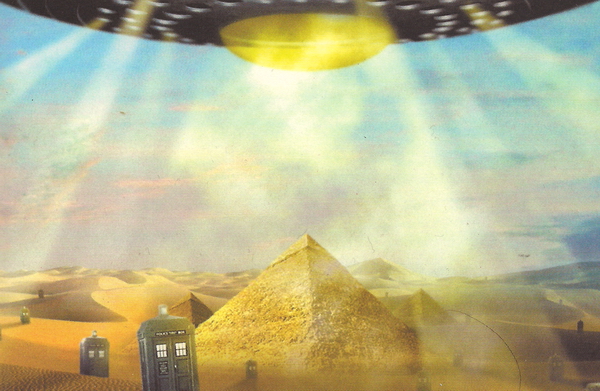|
| |
|
STORY PLACEMENT THIS STORY TAKES PLACE BETWEEN THE
NOVELS "RECKLESS "TIMELESS."
WRITTEN BY PAUL LEONARD
RECOMMENDED PURCHASE OFFICIAL BBC 'EIGHTH DOCTOR' PAPERBACK (ISBN 0-563-48605-8) RELEASED IN JUNE 2003.
BLURB Anji isn't sure, but then it's hard to be sure of anything AT THE MOMENT. Good Times INC promised a BRAND new tourist experience; hotels in every MAJOR period of human history. but SUCH arrogance comes with a price, and it's a price THAT the Doctor doesn't
want to pay.
alternative Earth, Anji and Fitz race to find out how to stop Good Times without stopping time itself - but they find that they can't even save each other. AND When the Doctor tries to help, it gets worse.
At the Last Resort, only Sabbath can save the day. And then the price gets even higher... |
|
|
The Last Resort JUNE 2003
With the notable exception of The Turing Test, The Last Resort is perhaps Paul Leonardís most remarkable Doctor Who novel. A scintillating synthesis of half-plagiarised ideas; wanton, meaningless death; and staggering temporal set pieces, this book may not be perfect, but itís certainly provocative.
As the bookís dedication betrays, The Last Resort owes much to veteran Who novelist Jim Mortimore, whose aborted first Doctor novel, Campaign (which was released in 2000 under a charity banner), explored the very same ideas with what many would argue was far greater poise. However, I think that The Last Resort has a lot more clout than its progenitor, though admittedly this has more to do with the role that it plays in the ongoing story arc than it does anything that its author did especially well. Falling as it does between Reckless Engineering and Timeless, the increasingly-unstable universe is at its most volatile in this story, allowing Leonard to attempt some absolutely audacious stunts that otherwise he wouldnít have been able to. Its positioning also means that as the story opens, the Doctorís companionsí faith in him is rapidly fading. Even Fitz, his oldest and dearest friend, finds that his trust in him has been severely shaken. And when the stakes become so high that the Doctor must employ extreme measures to try and fix the damage done to reality, Leonard is able to show us his companionsí confidence being completely shattered.
The nuts and bolts of this book are exceedingly alluring. Without the Time Lords to enforce the Laws of Time, unregulated time travellers have been sprung up all over creation, shifting the course of history everywhere that they go. The Last Resort sees matters reach breaking point as Good Times Inc - essentially a human travel agency - offers mankind cheap holidays to any period in the planetís history. Every instance of time travel (recreational or otherwise) then gives rise to an alternative time stream, the original housing the chain of events that led to the time travel (neatly avoiding any grandfather paradoxes, and thus allowing Leonard to kill of his cast ad infinitum), and the divergent stream seeing the consequences of the time travel played out. Both the Doctor and Sabbath realise that the entire multiverse is at risk of total collapse, and that one, consistent timeline must prevail within our universe in order to avert the anarchy...
premise, the execution leaves much to be desired. Not only is Leonardís presentation of the plot incredibly confusing, but it all but destroys any sense of pace, as a Groundhog Day- style litany of recurring events ensue. Particularly the first half put me in mind of the cyclical Star Trek: The Next Generation episode Conundrum, as the author rehearses the same and similar events with only a slight nuance of difference each time. This device may illustrate the mechanics of the focal idea beautifully, but itís not what Iíd call entertainment. Worse still, a lot of the technobabble is utterly impenetrable, and at times seems self-contradictory. Just when I thought Iíd grasped the Ďrulesí, those rules would shift Ė not unlike Time itself here.
This pitfall is more than made up for though by Leonardís deft handling of the TARDIS crew, including Trix, who after a few novels skulking in bowels of the ship finally finds her way into the fold here, albeit under a transparent alias. The shock tactic of killing companions might not have been very credible, even upon a first perusal, yet it still packs a punch, particularly when the reader has to stomach the bitter pill that the Doctor willingly sacrifices them. I love how this novel, more so than any other, explores just how similar the Doctor and Sabbath are when it comes down to it. Whilst Sabbath thinks nothing of indiscriminate killing if it furthers his agenda, worn down by Time and with his options running out, the Doctor is prepared to go what is, arguably, a step further and see his closest friends perish for what he believes to be the greater good.
And so whilst The Last Resort doesnít match the lofty literary
heights of The Turing Test, it is every bit as subversive a
text. Itís may be a mechanical read, as opposed to a rhythmical one, but
if the reader is capable of enduring all its convoluted ins and outs, then
itís also a immensely fulfilling one, and a real high point in the arc.
|
|
|
Copyright © E.G. Wolverson 2010
E.G. Wolverson has asserted his right under the Copyright, Designs and Patents Act, 1988 to be identified as the author of this work. |
|
|
Unless otherwise stated, all images on this site are copyrighted to the BBC and are used solely for promotional purposes. ĎDoctor Whoí is copyright © by the BBC. No copyright infringement is intended. |
|

.jpg)
.jpg)

 However,
despite the enticing
However,
despite the enticing